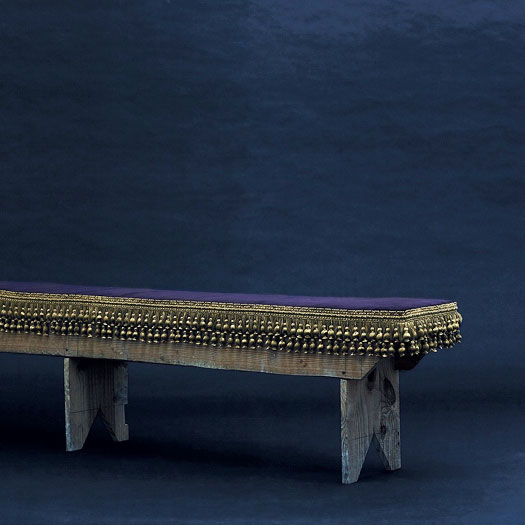
Banco Luizao Quinze (Louis XV Bench), StudioMK27's interpretation of an ad-hoc furniture piece built for a construction site in São Paulo. Photos: Reinaldo Coser, Gabriel Arantes
For the past two years, the architects of StudioMK27 — a small design firm in São Paulo, Brazil, led by Marcio Kogan — have been collecting examples of a little-known custom in their city: the making of temporary furniture by construction workers for their own use onsite. Such pieces are produced with surplus wood from the building materials and are typically discarded at the completion of the project or reused at another site in São Paulo.
Despite — or perhaps because of — their hasty fabrication from leftover wood, the pieces reveal an “amazing constructive intelligence,” said MK27 architect Mariana Simas. From their own project sites in São Paulo, Simas and her colleagues selected tables, benches, stools, chairs and shelves, and proceeded to make small modifications to them, or “grafts.” To contrast with the rusticity of the wood and the handmade method of production, they added rich materials and touches of industrial precision: a red enamel drawer slides out of a side table; a velvet, gold-tasseled cushion tops a long bench; stainless-steel casters turn a shelving unit into a rolling bar. Even as the designers established this visual contrast, the closeness of the Portuguese words luxo (luxury) and lixo (rubbish) was not from their minds, Simas said.
The finished pieces, 16 in total, were exhibited in late March at a high-end São Paulo boutique, Micasa. They are not for sale, but MK27 will create, on request, as many as three variations of each piece, which will retail from between $2,000 and $15,000. For these variations, the studio will continue to repurpose found pieces rather than commission workers to make them. When the workers first noticed the architects’ interest in their furniture, Simas recalled, they began to make pieces specifically for them, using different, more deliberate techniques. “We had to explain to them that the way they do it is what interests us the most, the spontaneous way,” she said. Because most of the pieces are crafted anonymously, the workers won’t profit from their eventual sale.
According to Simas, the project sparked debate inside the office, and some architects worried about accusations of exploiting the workers. But the desire to extend the functional life of these usually ephemeral objects, and to celebrate an authentic vernacular design tradition, won out.

